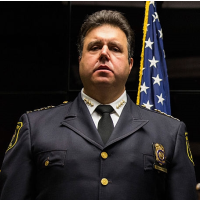Newark Police Dept. to Undergo Massive Overhaul in Wake of 3-Year Federal Investigation
 Former Newark chief of police Anthony Campos (photo: Andrew Burton, Getty Images)
Former Newark chief of police Anthony Campos (photo: Andrew Burton, Getty Images)
By Jason Grant and Rick Rojas, New York Times
NEWARK, N.J. — Federal officials announced on Wednesday that a sweeping settlement had been reached to reform the Newark Police Department after a three-year investigation uncovered a pattern of unconstitutional practices, including improper searches and stops and excessive use of force.
The proposed reforms, which must be approved by a judge, include putting cameras on officers and in police vehicles, increasing training and revamping department policies on the use of force and search-and-seizure practices.
The agreement also calls for the installation of a monitor to oversee the department’s compliance with the terms of the settlement and the creation of a civilian oversight committee, which the city, New Jersey’s largest, has already taken steps toward putting into place.
Officials said the reforms were meant to reduce the long-simmering animosity between the police and residents of this heavily African-American city of 270,000, which has long struggled with high crime.
“The department is challenged in fundamental ways, and has engaged in a pattern and practice of unconstitutional policing in a broad range of areas,” said Paul J. Fishman, the U.S. attorney for New Jersey. “And it is also clear that the Police Department’s relationship with the people of the city has suffered dramatically from the combination of those practices. Community trust has deteriorated, and that, in turn, has compromised the effectiveness of the department.”
The agreement had “the potential to make Newark a national model,” said Vanita Gupta, the head of the Justice Department’s civil rights division.
Newark’s mayor, Ras J. Baraka, had been a vocal critic of police misconduct while serving on the City Council. The results of the Justice Department investigation were released shortly after he took office in 2014.
“We look at it as an opportunity,” Baraka, a Democrat, said in a news conference on Wednesday. He conceded that he did not look forward to the costs the city would have to shoulder as part of the reforms, but the effort, he added, “will get Newark to where it needs to be.”
As part of the settlement, federal and city officials agreed that Peter C, Harvey, a former New Jersey attorney general, would serve as the monitor for the city’s compliance.
The federal inquiry began in 2011 after allegations of police brutality and false arrests. Three years later, the Justice Department issued a blistering 49-page report (pdf) documenting findings including that 75 percent of pedestrian stops cited by the police were not justified and that minorities were stopped more often than whites. Additionally, the inquiry found that the use of force by officers was underreported and revealed a pattern of theft of citizens’ property by officers in the narcotics, gangs and prisoner processing units.
But on Wednesday, officials were careful to blame not the department’s nearly 1,000 officers but rather systemic shortcomings, including a lack of training and support. The review included interviews with patrol officers, detectives, supervisors and commanders, as well as community and civil rights leaders, officials said.
“We found systems that not only failed the community, but also failed officers themselves,” Gupta said. “Our investigation made clear that you have been asked to do this tremendously difficult work without adequate policy guidance, training, supervision and support.”
Newark has already made some changes. Last year, Baraka hired Anthony Ambrose, a former Newark police chief and director, as the city’s public safety director. This month, the City Council moved forward on a plan to establish a civilian board to review police conduct. The board would have the power to issue subpoenas and conduct investigations, city officials said.
Lt. Alexander Martinez of the Superior Officers’ Association — the organization representing sergeants, lieutenants and captains in the Police Department — said that the settlement could have a significant impact.
“The consent decree is a positive step toward making the Newark Police Department a better agency through mandated training and increased supervision, two key points we have been pushing for many years,” he said.
James Stewart Jr., president of the Newark Fraternal Order of Police, which represents rank-and-file officers, said he was hopeful the agreement would address a numbers-driven culture, in which assignments and overtime were given out based on officers’ arrests and stops.
“From years and years and years of this going on, we’ve created this animosity with the citizens of the city, where no one wants to cooperate and no one wants to give you that tip that’s going to help break the job,” said Stewart, an officer in Newark for 21 years.
Under the settlement, the Police Department will remain under federal oversight until it is in compliance for two consecutive years.
Udi Ofer, the executive director of the American Civil Liberties Union of New Jersey, said residents of Newark had waited decades for intervention. While the consent decree addresses long-standing problems, he said “some gaps remain,” particularly with transparency and accountability.
The settlement, Ofer said, was “a historic moment in that long struggle for a fair, just and accountable police force. But now the hard work begins of transforming a police department that has long engaged in widespread constitutional violations.”
To Learn More:
Still the Most Dangerous City in the U.S.: Camden, New Jersey (by Noel Brinkerhoff, AllGov)
99% of Police Brutality Complaints in Central New Jersey are Dismissed or Ignored (by Noel Brinkerhoff, AllGov)
- Top Stories
- Unusual News
- Where is the Money Going?
- Controversies
- U.S. and the World
- Appointments and Resignations
- Latest News
- Trump to Stop Deportations If…
- Trump Denounces World Series
- What If China Invaded the United States?
- Donald Trump Has a Mental Health Problem and It Has a Name
- Trump Goes on Renaming Frenzy






Comments